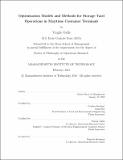| dc.contributor.advisor | Cynthia Barnhart and Patrick Jaillet. | en_US |
| dc.contributor.author | Galle, Virgile | en_US |
| dc.contributor.other | Massachusetts Institute of Technology. Operations Research Center. | en_US |
| dc.date.accessioned | 2018-05-23T15:03:45Z | |
| dc.date.available | 2018-05-23T15:03:45Z | |
| dc.date.copyright | 2018 | en_US |
| dc.date.issued | 2018 | en_US |
| dc.identifier.uri | http://hdl.handle.net/1721.1/115592 | |
| dc.description | Thesis: Ph. D., Massachusetts Institute of Technology, Sloan School of Management, Operations Research Center, 2018. | en_US |
| dc.description | This electronic version was submitted by the student author. The certified thesis is available in the Institute Archives and Special Collections. | en_US |
| dc.description | Cataloged from student-submitted PDF version of thesis. | en_US |
| dc.description | Includes bibliographical references (pages 175-182). | en_US |
| dc.description.abstract | Container terminals, where containers are transferred between different modes of transportation both on the seaside and landside, are crucial links in intercontinental supply chains. The rapid growth of container shipping and the increasing competitive pressure to lower rates result in demand for higher productivity. In this thesis, we design new models and methods for the combinatorial optimization problems representing storage yard operations in maritime container terminals. The goal is to increase the efficiency of yard cranes by decreasing unproductive container moves (also called relocations). We consider three problems with applicability to real-time operations. First, we study the container relocation problem that involves finding a sequence of container moves that minimizes the number of relocations needed to retrieve all containers, while respecting a given order of retrieval. We propose a new binary integer program model, perform an asymptotic average case analysis, and show that our methods can apply to other storage systems where stacking occurs. Second, we relax the assumption that the full retrieval order of containers is known in advance and study the stochastic container relocation problem. We introduce a new model, compare it with an existing one, and develop two new algorithms for both models based on decision trees and new heuristics. We show that techniques in this chapter apply more generally to finite horizon stochastic optimization problems with bounded cost functions. Third, we consider the integrated container relocation problem and yard crane scheduling problem to find an optimal sequence of scheduled crane moves that perform the required container movements. Taking into account practical constraints, we present a new model, propose a binary integer program using a network flow-type formulation, and design an efficient heuristic procedure for real-time operations based on properties of our mathematical formulation. We relate this problem to pick-up and delivery problems with a single vehicle and capacities at every node. In all three chapters, the efficiency of all our algorithms are shown through extensive computational experiments on available problem instances from the literature and/or on real data. | en_US |
| dc.description.statementofresponsibility | by Virgile Galle. | en_US |
| dc.format.extent | 245 pages | en_US |
| dc.language.iso | eng | en_US |
| dc.publisher | Massachusetts Institute of Technology | en_US |
| dc.rights | MIT theses are protected by copyright. They may be viewed, downloaded, or printed from this source but further reproduction or distribution in any format is prohibited without written permission. | en_US |
| dc.rights.uri | http://dspace.mit.edu/handle/1721.1/7582 | en_US |
| dc.subject | Operations Research Center. | en_US |
| dc.title | Optimization models and methods for storage yard operations in maritime container terminals | en_US |
| dc.type | Thesis | en_US |
| dc.description.degree | Ph. D. | en_US |
| dc.contributor.department | Massachusetts Institute of Technology. Operations Research Center | |
| dc.contributor.department | Sloan School of Management | |
| dc.identifier.oclc | 1036985395 | en_US |
